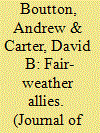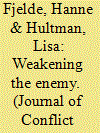|
|
|
Sort Order |
|
|
|
Items / Page
|
|
|
|
|
|
|
| Srl | Item |
| 1 |
ID:
134937


|
|
|
|
|
| Summary/Abstract |
Why do some terrorist organizations, but not others, adopt suicide bombing as a tactic? Dominant accounts focusing on organizational capacity, ideology, and efficacy leave certain elements of the phenomenon unexplained. The authors argue that a key factor that influences whether a terrorist organization does or does not adopt suicide terrorism is cultural resonance. This is the idea that deep and specific cultural logics, which transcend religion and nationalism, enable and constrain the sorts of instrumental behaviors that can be utilized in the pursuit of group goals. The article investigates the role of a well-established cultural orientation of collectivism, which enables the authors to measure culture systematically. Case studies, survey data, and experimental research are used to illustrate that collectivism lowers the cost of adoption by facilitating the recruitment of attackers and reducing societal backlash against self-sacrifice. The authors then test for the relationship between collectivism and suicide-bombing adoption using an event history analysis framework, finding a strong correlation.
|
|
|
|
|
|
|
|
|
|
|
|
|
|
|
|
| 2 |
ID:
134938


|
|
|
|
|
| Summary/Abstract |
The research on the influence of democracy on terrorism renders support for two causal mechanisms. One is that democracy reduces terrorism because it creates an environment in which dissenters can pursue their interests through peaceful means. The other argument states that democracy encourages terrorism due to the intrinsic liberties and freedoms that provide an opportunity for terrorists to easily organize, recruit, and mount operations. This article contributes to this second line of thought by framing support for rebel groups as one of the contexts in which democracy’s influence on terrorism is examined. I identify a theoretical mechanism about how democratic states unknowingly facilitate terrorism by letting terrorists freely stay within their borders, raise funds, smuggle arms, and operate offices. The empirical findings provide support for the hypothesis that democracies are vulnerable and can easily be exploited by terrorists since they have an environment conducive to terrorist activities.
|
|
|
|
|
|
|
|
|
|
|
|
|
|
|
|
| 3 |
ID:
134933


|
|
|
|
|
| Summary/Abstract |
While it is commonly assumed that the United States uses foreign aid as an instrument to combat global terrorism, it is unclear whether it views terrorist threats to other countries, particularly its allies, with urgency. We show that the relationship between transnational terrorism and foreign aid flows is strongly conditional on whether terrorist activity based in a potential recipient directly threatens the United States. Using data on terrorist attacks and casualties in potential recipient countries, we demonstrate that terrorist activity based within a state’s borders, which targets US interests is a strong determinant of both whether that state receives any aid and also how much aid it receives. In contrast, the presence of terrorism targeted at non-US interests, even if it targets formal allies of the United States, is generally unrelated to US aid allocation. These findings suggest that the United States' use of foreign aid to fight terrorism and political violence is narrowly tailored to assist countries that directly threaten its own security, rather than those of other countries, even its allies.
|
|
|
|
|
|
|
|
|
|
|
|
|
|
|
|
| 4 |
ID:
134939


|
|
|
|
|
| Summary/Abstract |
How does the hawkish or dovish nature of the domestic opposition in one state influence its own, as well as an international opponent’s, negotiating behavior? I show that doves, when negotiating in the presence of a hawkish opposition, have more bargaining leverage in international negotiations. The key is to understand an international opponent’s preference to deal with a dove rather than a hawk in future negotiations. I argue that adversaries have an incentive to concede more in negotiations to doves in order to sustain them in office, because failing to give concessions may lead to their replacement by less conciliatory (more hawkish) governments in the future. For this reason, doves are more likely than hawks to extract critical concessions from adversaries. The empirical results support this argument, which altogether suggests that doves are more successful in international negotiations not because they are more conciliatory, but rather because, for domestic reasons, they have greater bargaining leverage to extract counter-concessions from adversaries
|
|
|
|
|
|
|
|
|
|
|
|
|
|
|
|
| 5 |
ID:
134935


|
|
|
|
|
| Summary/Abstract |
We assessed whether intergroup contact at a nation-building intervention in Malaysia improved participants’ perceptions of threat and outgroup evaluations and whether this process was conceptually moderated by group status in a three-group setting. We found evidence of a strong relationship between post-intervention contact and post-intervention outgroup evaluations in all groups and evidence of indirect effects of post-intervention contact on outgroup evaluations by symbolic threat for the minority groups rating the majority group. We found that in the context of institutional inequalities, integrated threat theory may not be sufficiently complex to uncover the processes that underlie the contact–attitude link for majority groups rating minority groups. Further, we found indirect effects of post-intervention contact on outgroup evaluations via realistic threat for interminority group ratings. Thus, we elucidate some of the different mechanisms that underlie the intergroup perceptions of majority and minority group members.
|
|
|
|
|
|
|
|
|
|
|
|
|
|
|
|
| 6 |
ID:
134934


|
|
|
|
|
| Summary/Abstract |
Scholars have long conceptualized public support for war as the product of a cost–benefit calculation in which combat casualties factor significantly. This article argues that, when calculating the human costs of conflict, Americans care about more than just the number of war dead; they also care about the distribution of those casualties across society. Using two original survey experiments, we show that inequalities in sacrifice affect Americans’ casualty sensitivity. We find strong evidence that learning about socioeconomic inequalities in casualties in previous wars decreases Americans’ casualty tolerance toward future military endeavors. These effects are stronger for some mission types, particularly non-humanitarian interventions, than others. The effects are also concentrated among Americans from states that suffered high casualty rates in the Iraq War. Our results suggest that raising public awareness of inequalities in wartime sacrifice could significantly strengthen popular constraints on policy makers contemplating military solutions to future crises.
|
|
|
|
|
|
|
|
|
|
|
|
|
|
|
|
| 7 |
ID:
134936


|
|
|
|
|
| Summary/Abstract |
While case-based narratives from civil wars often stress the ethnic dimension of civilian atrocities, cross-national studies have found limited evidence in support of such contentions. Addressing this debate, we argue that warring actors often use ethnic affiliation to identify groups of suspected enemy supporters when individual wartime affiliations are not known. Since warring actors depend on their civilian constituencies for support, collective targeting of the enemy’s co-ethnics becomes a strategy for weakening the enemy’s capacity. Armed actors are thus more likely to engage in civilian abuse in areas where the enemy’s ethnic constituency resides. To examine this argument, we combine new georeferenced event data on violence against civilians in African conflicts, 1989–2009, with spatial data on the location of the warring actors’ ethnic constituencies. The analysis shows that the number of civilians killed by both governments and rebel groups is higher in areas inhabited by the enemy’s ethnic constituency.
|
|
|
|
|
|
|
|
|
|
|
|
|
|
|
|
|
|
|
|
|